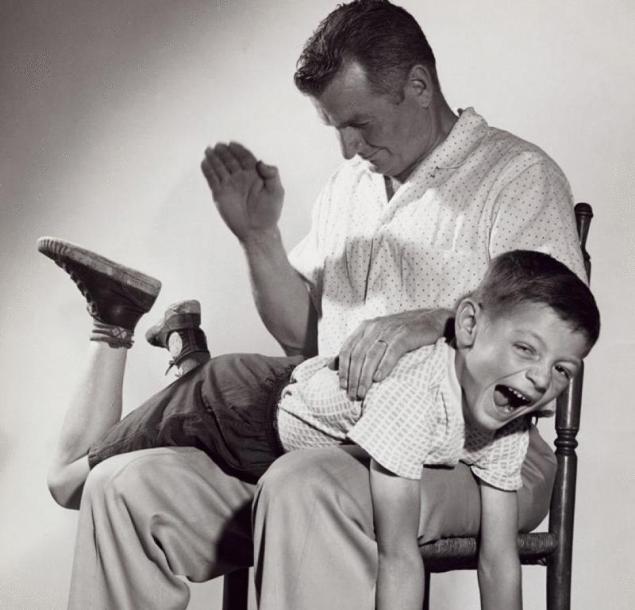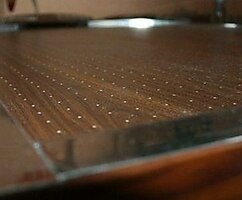Why hitting children is an ineffective way of education
 Bashny.Net
Bashny.Net

Corporal punishment is unable to change the behavior of the children in the long term. Instead, it increases their aggressiveness.
Want your child to stop doing something dangerous/annoying/forbidden, what is he doing now? Perhaps it is possible to spank with a belt or hit and it will help — but only for a very short period of time.
In this case, prepare yourself for what your child will become more aggressive behave in relation to you or your brothers and sisters, friends, and in adult life in relation to his wife. Oh, and prepare to appearance and other forms of antisocial behaviour.
In a recent scientific analysis of two decades of research long-term effects of physical punishment of children, published Monday in the article "Journal of the Canadian medical Association" concluded that corporal punishment does not work and can actually lead to long-term negative consequences for children's development.
The study of corporal punishment is a difficult subject for researchers who are unable randomized to divide children into groups where they are beaten, and groups where no corporal punishment. Instead, they monitor the development of children for many years, recording how often they receive corporal punishment, and then over time they measured levels of aggression. "We found that children subjected to corporal punishment become more aggressive, and those who are not subjected to corporal punishment, over time, become less aggressive," according to Joan Durrant, the main author, a clinical child psychologist and Professor of family and social Sciences at the University of Manitoba.
In fact, regardless of the age of the child or size of the sample, none of more than eighty studies of the effects of corporal punishment have failed to demonstrate positive effects. "If someone wants to hit us to change our behavior, it may harm our relationship with that person. We can feel resentment," says Durrant. "Children feel the same way. To do so is not constructive."
Children subjected to corporal punishment, may feel depressed and obsceneness and impaired self-esteem. Severe punishment may lead to long lasting consequences, as they contribute to the fact that children, in desperation, trying to avoid corporal punishment, they learn to lie. Corporal punishment is associated with the emergence of various mental disorders in later life, including depression, anxiety, alcohol and drug abuse. There is evidence neuroimaging studies that show that corporal punishment can change the brain that are operated when performing the tests of intellectual development (IQ tests), and increase the likelihood of alcohol and drug addictions. Also found preliminary evidence that corporal punishment may adversely affect areas of the brain associated with regulation of stress and emotions.
And yet, as I wrote last summer in an article about the first ongoing real-time study of parents who apply corporal punishment to their children, some scientific data show: up to 90 % of parents say they use the methods of physical punishment:
Despite the availability of a range of disciplinary methods, including the notorious "corner", the redirection of focus and a greater emphasis on positive discipline (try substituting "don't spill the juice" to "be careful, keep your Cup"), the belt and the slap is still popular.Moms and dads who beat their children do so because they believe that it is an effective method of education, and studies do confirm this, but in the short term. If the baby stretches to the needed object, it is possible to stop slapping hands. "It really triggered in the immediate situation, but outside it, in most cases, this method is inefficient", says George Holden, one of the authors of the study and Professor of psychology southern Methodist University. "The most frequent long-term consequence of using this method is that children learn aggressive behavior".A vivid example: one mother who participated in the study, they struck child after child, or hit, or kicked your mother — with the following admonition: "It is for you to remember that you can not beat a mother.""The irony of this situation is startling," says Holden.In some countries corporal punishment is not allowed. The Durrant now resides in Sweden, where it explores how the legislation regulates the issues of children and families, as well as the evolution adopted in this country of a law prohibiting corporal punishment of children. In 1979 Sweden became the first country to adopt such a law; now a similar law has been adopted in thirty-two countries, including most of Europe, Costa Rica, Israel, Tunisia and Kenya.
Neither the United States nor Canada has not joined this movement. "Whenever I mention the law, there is a belief that it is government meddling in how I raise my kids", says Durrant, — [but in Sweden] it is perceived as a way to ensure that children get the best possible starting conditions in life."
Parents often beat their children, do so on the machine. Many, especially those who experienced childhood corporal punishment believe that spanking and slap are the only disciplinary tactic in their Arsenal. Doctors have the opportunity to change this trend by teaching parents about normal stages of child development, recommendations of alternative ways of disciplining children, as well as concerned parents to appropriate sources of information and education programmes on teaching parenting skills. In Sweden, for example, young parents are involved in support groups and provide them with information about the stages of child development.
As a result, parents come to understand that their children are not ill-intentioned perpetrators, it's just a natural manifestation, corresponding to the period of their development. "When children see someone resolve the conflict by means of aggression, increasing the likelihood that they will learn, atmo behavior", says Durrant. "Two year old toddlers are the most aggressive people on earth. They do not understand the consequences of their behavior and unable to contain myself. Therefore, the more often children witness the resolution of conflict by means of aggression, the more aggressive he becomes."
The girl who wears a bowl of cereal on his head probably is not bad: it just makes me wonder what's going to happen. The Durrant likes to cite the example of his son. When he was three, he dropped the toothbrush his father to the toilet. Another parent might have yelled to the child, but academic education Durrant helped her understand that the child was just experimenting: he dropped the object in water in the bath tub and sink and have not received a single reprimand, so why not try to drop something in the toilet? "I explained to him that falls into the toilet, and then asked: "do you think you want now your daddy stick in the mouth that a toothbrush?""
P. S. After this, the son of Durrant never threw anything forbidden in the toilet. published
Author: Bonnie Rohman
Source: integraltranslations.wordpress.com/2012/02/13/time-fizicheskoe-nakazanie/#more-94
Tags
See also
Why adult children don't respect their parents
Why sick kids: pediatric psychosomatics
The secret of school success: why do some children learn good and some bad
The secret of school success: why do some children learn well and others badly?
A farmer from the USA living in Russia about why their children does not give to school (video)
Is it possible to raise children without resorting to punishment
YOU chose the wrong partner and a few of the reasons why you have no child
About punishment

















